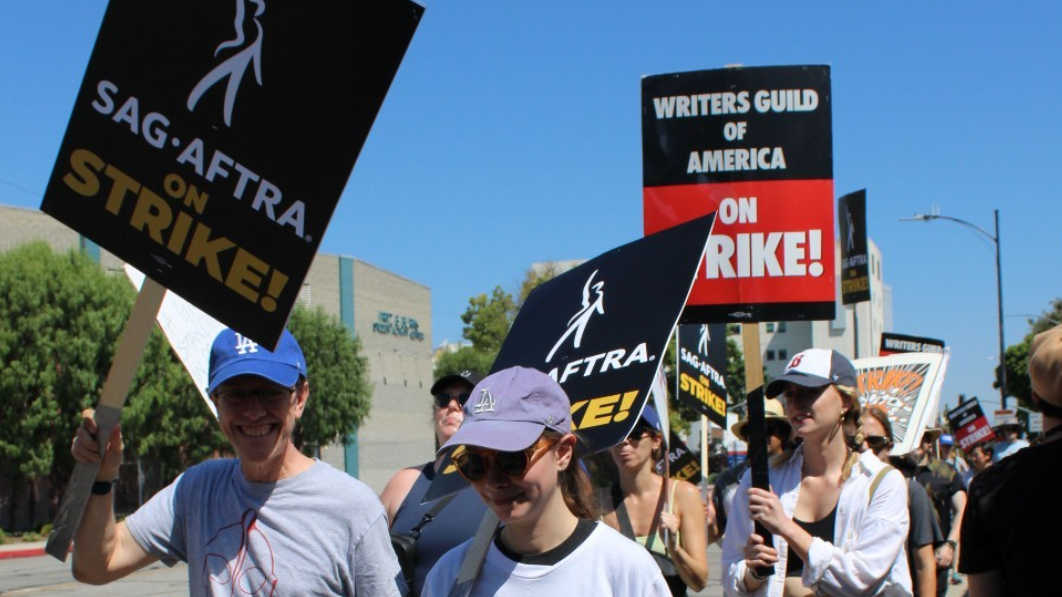
SAG President Fran Drescher Explains Why She Felt Forced to Strike
By Movieguide® Contributor
SAG President Fran Drescher shared that she never wanted her union to go on strike.
With some of her union’s members making less than $10,000 a year, and many making under $65,000 a year, the financial strain of a strike would be very costly. The low salaries, however, are exactly the reason the strike needed to happen.
“We wanted to avert a strike, if at all possible,” Drescher told Variety. “Most [of our] members are working class. So the impact of a strike did weigh heavy on me and the negotiating committee, that a strike would have a profound impact on them, but they did give us unprecedented support to strike if we felt like we needed it.”
“Remember, Tom Cruise and top people make their own deal. That’s not who we are striking for. We’re striking for the journeyman,” she later added.
Early in the negotiation, Drescher was optimistic that a deal would be able to be made without needing a strike; however, looking back she believes the studios never seriously considered the change in industry standards that SAG is demanding as they look to change their contracts to reflect the shift from traditional television and movies to on-demand streaming services.
“We can’t just make incremental changes because what things are gonna give us more?” she said. “They’re gonna raise the cap, some residuals, how much are they going to raise the minimum? Again, at the end of the day, we’re moving furniture around on the Titanic.”
“[We want] a new business model,” Dresher continued. “The whole residual component of the old contract: What is the longevity of the show and the long string of pay, none of that exists with streaming? We have to find the pocket of that money, so we get our rightful share because we’re building this platform and they are building the business on us.”
In response to Drescher and SAG’s emphatic cries about receiving more money from streaming services, executives have been quick to point out that these platforms struggle to make a profit under the current system, so how could they possibly survive if they had to dole out more money to actors?
Dresher believes the money problem lies with the size of the streaming services productions. Rather than create smaller, character-driven shows, the streaming services opt for billion-dollar shows that end up not being worth their cost.
“[Actors] have to be happy, right? They have to feel love, they have to feel honored. They are the center of the wheel. And they’re getting squeezed out and it’s so wrong,” she said. “Are [the executives] not aware we’re living in a capitalist country, not a feudal country with land barons and serfs?”
Yet the actors are the ones who bear the brunt of the cost of these large productions. Rather than pay them fairly, their salaries are kept low so bigger and more expensive productions can always be in the works.
“If you spend 80% on [the] production, maybe spend 79% and we can get our fair share,” Drescher said. “The money that’s paid for all this, including the CECO salaries, is in the subscriptions! It’s not in episodes or seasons anymore.”
One idea SAG has proposed to properly compensate actors for their work on streamed projects is to pay based on the revenue attributed to the show based on Parrot Analytics Content Valuation Tool. This would allow actors to become proportionally paid based on the popularity of their shows.
“We have said in conversations with the CEOs that we need to get into that pocket of subscriptions because that is the new name of the game. It’s not eyeballs or ad dollars,” Drescher said. “We were more than willing to discuss any structure that would get us into that appropriate pocket to be able to maintain the kind of revenue shared that we deserved and we have been used to in other business models.”
The industry executives still see it otherwise and are intent on keeping actors’ paychecks away from their subscription revenue. As a content desert approaches, however, the executives may be forced to give in to the pressures of Drescher and her striking union.
Movieguide® previously reported on the SAG strike:
The industry has already been suffering from the WGA strike that has been ongoing since the beginning of May. Production on most scripted shows and movies have been delayed until the WGA members come back to work. Now, as 160,000 actors and other performers join the strike, the only projects that can still be worked on are those in the post-production phase.
Viewers have already started to feel the effects of the strike as late-night comedians like Jimmy Kimmel and Stephen Colbert have been off air since the writers’ strike began. However, as the strikes extend, the effects will become more widespread. The upcoming fall season could be void of new episodes on scripted shows including ABBOT ELEMENTARY, LAW AND ORDER: SVU and NCIS.
These popular scripted shows are one of only a few lifelines that traditional television has to keep itself afloat.
“The networks have sports and new but a lot of their constituents are there to watch the prime-time shows,” said Neil Begley, a senior vice president for Moody’s Investors Service. “Among those viewers, there’s an expectation that fall is the start of the new season. The networks are going to have to reach far and wide for content to fill those hours.”
The TV advertising market has also been sluggish as a result of the strikes, further eating into the networks’ revenue.
“Advertisers don’t know what type of programming they’re going to get with these strikes,” Begley explained. “They’re saying: Why commit?”
https://www.instagram.com/p/Cu4bEh4ORJj/
Questions or comments? Please write to us here.


 - Content:
- Content: 

